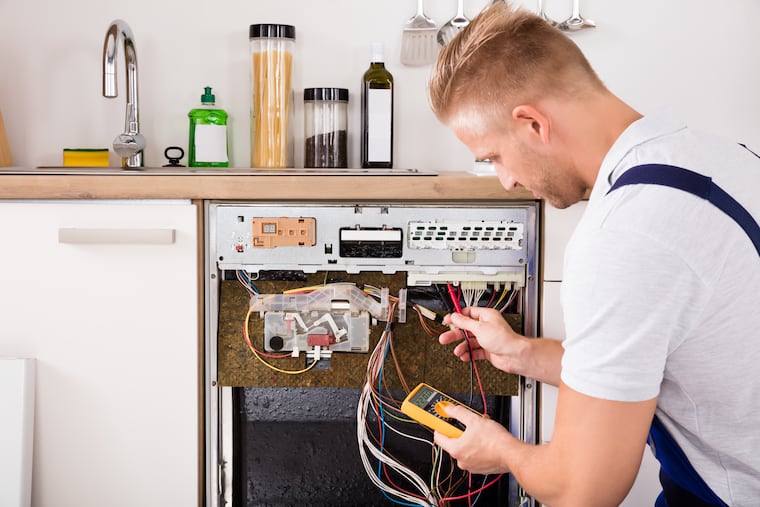Power up your search for high-quality appliance repair help
On average, lower-priced companies rate higher on service quality than their higher-priced competitors.

The appliances we take for granted — dishwashers, refrigerators, washers, dryers, and ovens — seem to always break down at the worst possible times. Like right before a dinner party or a holiday get-together. That's when a good repair service can save a lot of grief — and money.
Delaware Valley Consumers' Checkbook rated local appliance repair services and fortunately found local shops that were rated highly by surveyed customers and were also among the lowest priced. In fact, on average, lower-priced companies rated higher on service quality than their higher-priced competitors.
You can see ratings of local appliance repair services, advice on choosing and dealing with a service, when to repair vs. replace appliances, and tips on repairs you can make yourself until Nov. 5 at Checkbook.org/Inquirer/ApplianceRepair.
Checkbook asked area consumers (primarily Checkbook and Consumer Reports subscribers) to rate appliance repair services on such factors as "doing work properly on the first try," "starting and completing work promptly," and "overall quality." The ratings varied substantially — some companies were rated "superior" overall by more than 90 percent of their surveyed customers, but some received "superior" ratings from fewer than 50 percent.
Checkbook researchers collected prices on carefully specified repair jobs and found it pays to choose a service wisely because local services charge very different prices for the same repairs. For example, price quotes to replace the drum belt on a Roper clothes dryer ranged from $110 to $206. To replace gaskets for upper and lower doors on a Whirlpool refrigerator, prices ranged from $260 to $462.
When you're looking for a repair shop, first check if the appliance is still under warranty — if it is, you'll be limited to factory-authorized shops.
Unfortunately, manufacturers don't necessarily pick the best companies to perform their warranty repairs. Manufacturers rarely, if ever, check on the quality of their authorized shops, and those that do conduct only occasional cursory reviews. Checkbook found that shops performing warranty repairs get far lower ratings from their customers than shops that don't.
When you call shops, be prepared to describe your appliance's symptoms and its manufacturer and model number.
In addition:
Be sure to find out how the company charges for service calls.
Ask about the minimum charge and how much time is included in the minimum.
Ask how the shop figures repair charges. About half the services Checkbook rated use a flat rate schedule — they compute a job's labor charge by multiplying its hourly labor rate by the amount of time allotted for that job according to one of several published manuals. Others charge on a time-and-materials basis for the work performed beyond the time covered by their minimum service call charge. Checkbook found that hourly rates vary dramatically, so be sure ask what that rate is.
When you get a diagnosis, ask for a written estimate before proceeding with repairs.
And then you may have a decision to make: repair or replace? It's not always a clear-cut decision.
For example, the "average life span" cited for appliances can be misleading. If you have an appliance that is seven years old, and it has an average life span of 12 years, it's actually very likely to work well beyond that average figure. Also, don't assume that because one component of an appliance breaks means that others will soon follow. The appliance might last years without any further problems. Also factor in your usage — if you only do a few loads of laundry a week, the washer/dryer is apt to last longer than average.
On the other hand, you might yearn for new features, a new look, or greater energy efficiency. (Keep in mind that some appliances, such as clothes dryers, aren't much more efficient today than they were years ago, and even with appliances that have made strides, energy use won't change if you only do a handful of loads a week.)
If you decide to repair:
Ask about any warranties on parts and labor.
Ask to keep, or at least see, any replaced parts. You have a right to them.
Ask for a dated invoice before paying. It should itemize charges for labor and parts, and include any warranty.
If you can, pay by credit card. If there is a problem, you can dispute the transaction with your credit card issuer.
Delaware Valley Consumers' Checkbook magazine and Checkbook.org is a nonprofit organization with a mission to help consumers get the best service and lowest prices. It is supported by consumers and takes no money from the service providers evaluates. You can access all of Checkbook's ratings of area service providers free of charge until Nov. 5 at Checkbook.org/Inquirer/ApplianceRepair.